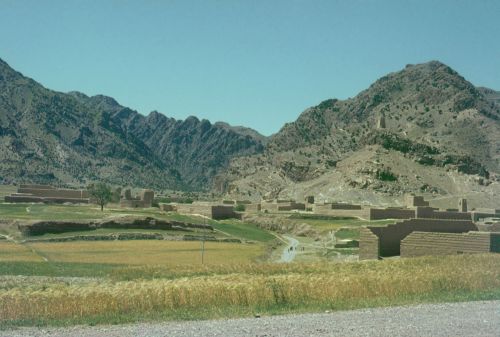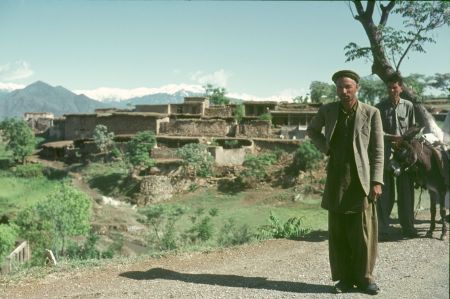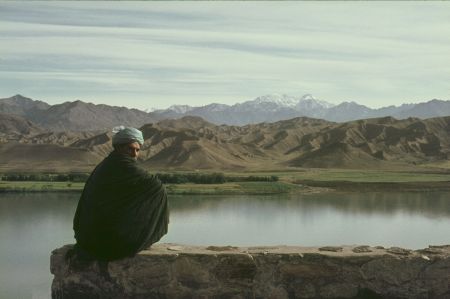| Barelds - Cycling around the world - Cycle stories - Asia, Africa, Europe, America | ||||||||||||||||||||
| home | site map | world | children | recent | cooking | dutch | german | react | ||||||||||||
Central-Asia and Europe 1969 (2).

Pakistan: Constructing villages as real fortresses in the tribal areas of the Khyber Pass were no luxury as became apparent in the last decades.
A
t the Indian-Pakistani border there was a long queue of cars, among which a convoy of Landrovers with an iron grid before the bumper, loaded with water and petrol cans. "A little exaggerated in this part of the world", Henny said and took a gulp of water from his bottle, the only water supply which we carried with us.The customs officer sat under a linen shed, outdoors, with a pile of passports in front of him. "Come here friend", he beckoned us, "jolly good that you are cycling!" Bang!, a stamp in our passport. A sign to a diligent official, who wanted to check our panniers. "Leave it, not necessary." Bang! Another stamp.
"Friends, have a nice journey". Hours later we were overtaken by the Landrovers.
Whether we could cross the border to Pakistan, had been our scary question, during all these weeks that we cycled through India. Because of the skirmishes which had troubled us a lot when we were in Bangle Des (then still East-Pakistan), the situation in West-Pakistan was also very unstable. The local newspapers kept us informed, shortly before we approached the border a general came into power who restored the state of siege. All became quiet again.The consequence was, however, that sleeping in a roof bungalow had become practically impossible "No sir, reserved for the military".

Pakistan: A man in the Swat district in the N.W of the country, they did't mind at all that photo's were taken of them.
"Parts ? No you cannot get parts here, but I will tell you where you can find a good bicycle repairer". A nipple that came loose from the gear cables was soldered on it so that it would never come loose again. Ingenuity and craftsmanship solve any parts problem here. A cup of tea with it to make it sociable and no fee, but just the honour was enough.
Every day I cycle thirty kilometres to my work and back again", another cyclist told us who accompanied us for a long distance. We had asked him, flabbergasted, about the enormous dimension of his front chain wheel. "I had it especially made", he said proudly, "Then you go faster".
In India either we or our bicycles were the subject of curiosity or interest, here in Pakistan the men stood transfixed; staring at me. Instead of my trousers, which I had lost somewhere, I wore my pyjama trousers under my dress to be covered a bit more.

Afghanistan: A reservoir built by the Germans for the Afghani, he can enjoy the work done by others for them.
Through a wide cleft, deep down us, flowed the grand river Indus. Merely the name fascinated us, because of the meaning of the great cultures, which flourished on her banks, thousands of years back. On a small, protruding, platform, I enjoyed the view and Henny wanted to take a picture of me. Immediately a enormous turmoil, shouting soldiers came running towards us, fiercely pointing and looking angrily. We did know that because of the martial law, you were not allowed to take pictures at many places, certainly not so near to a bridge, quickly Henny put away his camera.
| Start World around | Central Asia | << Previous | Next page >> | |||
| Barelds on bicycle through the world - Cycling in Asia, Europe, Africa, America | ||||||